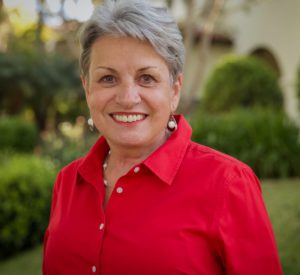Tagged: “Education”
A Fireside Chat with Dr. Robert Enright
Dr. Robert Enright, the 2022 recipient of the prestigious American Psychological Foundation (APF) Gold Medal Award for Impact in Psychology, is featured in a just-released video presentation titled “APF at Home: A Fireside Chat with Dr. Robert Enright.”
The 1 hr. 25 min. fireside chat is part of a series developed by the APF that focuses on pioneering American psychologists “whose work has had a game-changing impact on the field of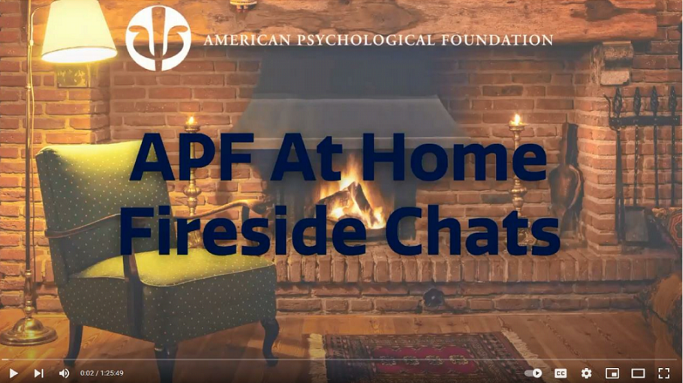 psychology.” Dr. Enright, founder of the International Forgiveness Institute (IFI), has been called “the forgiveness trailblazer” by Time magazine. His 37-years of forgiveness research has resulted in noteworthy innovations in forgiveness education and forgiveness therapy.
psychology.” Dr. Enright, founder of the International Forgiveness Institute (IFI), has been called “the forgiveness trailblazer” by Time magazine. His 37-years of forgiveness research has resulted in noteworthy innovations in forgiveness education and forgiveness therapy.
“Fireside Chats,” became a popular communications tool when President Franklin Roosevelt began a series of radio broadcasts that aired from 1933 through 1944. They were planned as conversations rather than stiff public speeches and were widely listened to because all the national radio networks carried them. In them, the President appeared to talk with his listeners rather than lecturing at them. And, yes, he actually sat next to the White House fireplace during the broadcasts.
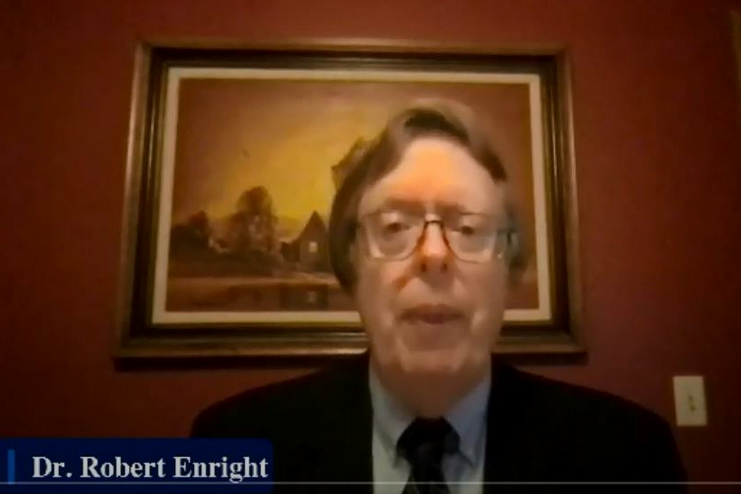 The fireside chats now being produced by the APF are intended to replicate that informal ambience. The latest interview, for example, features APF Trustee Dr. Katherine Nordal chatting with Dr. Enright. She asks him questions like how he selected forgiveness as the topic of his life’s work, how his Process Model of Forgiveness can be used in therapy interventions, and how forgiveness can become the crucial missing piece of the world’s peace puzzle. Dr. Enright answers questions submitted by viewers of the live presentation during the final 20 minutes of the session.
The fireside chats now being produced by the APF are intended to replicate that informal ambience. The latest interview, for example, features APF Trustee Dr. Katherine Nordal chatting with Dr. Enright. She asks him questions like how he selected forgiveness as the topic of his life’s work, how his Process Model of Forgiveness can be used in therapy interventions, and how forgiveness can become the crucial missing piece of the world’s peace puzzle. Dr. Enright answers questions submitted by viewers of the live presentation during the final 20 minutes of the session.
Dr. Nordal is well-equipped to conduct the APF fireside chat with Dr. Enright. She is a licensed psychologist whose distinguished career included owning and managing a full-time group private practice in Mississippi for 28 years. She spent another 10 years as Executive Director for Professional Practice for the American Psychological Association (APA) before retiring in 2018.
APF is the private grant-making arm of the APA and provides more than a million dollars annually in awards to fund research by psychologists and psychology students.
More Information:
A Fireside Chat with Dr. Robert Enright – Watch the entire presentation on YouTube.
APF at Home Fireside Chats – Watch all the videos in the series.
‘Tis the Season: The 17 Podcasts of Forgiveness
December is often referred to, particularly in song, as “the most wonderful time of the year.” Soon there will be 17 more items to add to that list of reasons why this time of the year is so special—17 new podcasts focusing on how forgiveness can enhance your holidays and your life.
The “17 Days of Forgiveness” podcast series is a joint venture between forgiveness forerunner Dr. Robert Enright, co-founder of the International Forgiveness Institute (IFI), and Dr. Alexandra Miller Clark,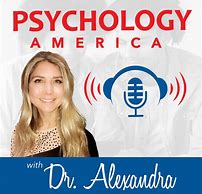 Psy.D., a licensed psychologist in New Jersey whose upbeat podcast program “Psychology America,” has taken the Internet world by storm.
Psy.D., a licensed psychologist in New Jersey whose upbeat podcast program “Psychology America,” has taken the Internet world by storm.
“This new series is groundbreaking because each of the 17 podcasts focuses on just one element of the forgiveness process,” Dr. Alexandra explains. “That enables us to produce what I call ‘super brief episodes’ that are each between five and ten minutes in length.”
In the first program released on Dec. 1, for example, Dr. Alexandra asks just one question: “What is the definition of forgiveness?” Dr. Enright provides a complete yet succinct answer in less than five minutes of podcast time.
In the second episode of the series, Dr. Alexandra asks: “What are the benefits of forgiveness?” Dr. Enright’s response, less than nine minutes in length, summarizes decades of scientific research documenting the physical and emotional benefits of forgiveness.
The remaining episodes include:
3. What are the two paradoxes of forgiveness?
4. Does forgiveness have to be about religion?
5. What is it to work the “forgiveness muscle?”
6. How do we become “forgivingly fit?”
7. What are some of the obstacles to forgiving?
8. Why is an “eye for an eye” not the right way?
9. If I forgive, I’m afraid I’ll forget OR if I forgive, I’m afraid I won’t forget.
10. Why is forgiveness better than a neutral attitude toward the wrongdoer?
11. Isn’t forgiveness unhealthy repression?
12. Do I forgive if the person continues to hurt me?
13. Should I forgive immediately or should I take some time first?
14. How do we decide who to forgive first?
15. How long does it take to get emotional relief after forgiving?
16. How often should I forgive?
17. Can forgiveness and justice happen together?
New episodes of the series will be released every few days on the Psychology America website where they are available at no cost. No special software is required to tune into the podcasts and they can be accessed using Apple Podcasts, Buzzsprout Podcasts, Google Podcasts, Stitcher Podcasts, Pandora, Spotify, and other podcast apps. Website visitors can also subscribe at no cost to receive automatic email notification when new podcast episodes are posted.
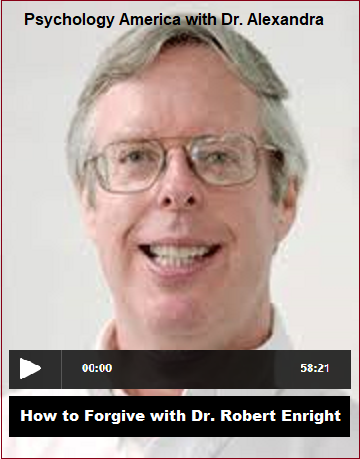 “Dr. Alexandra created and produced the 17 podcast episodes at absolutely no cost to the IFI,” according to Dr. Enright. “She knows that forgiveness can positively impact people who are hurting, and she is a fabulous forgiveness ambassador who is helping others learn about its amazing benefits.”
“Dr. Alexandra created and produced the 17 podcast episodes at absolutely no cost to the IFI,” according to Dr. Enright. “She knows that forgiveness can positively impact people who are hurting, and she is a fabulous forgiveness ambassador who is helping others learn about its amazing benefits.”
More than 65 podcast episodes are currently available on Dr. Alexandra’s website including two programs featuring interviews with Dr. Enright: “How to Forgive” (58 min.) and “Rehabilitating the ‘Forgotten People’: Prisoners” (1 hr. 7 min.).
Dr. Alexandra is a mother of four and an expert in family systems psychology, cognitive behavioral psychology (CBT) and clinical psychopharmacology. She has earned a Doctorate in Psychology, a master’s degree (Ed.S.) in Marriage and Family Therapy, and a Master of Science (MS) Degree in Clinical Psychopharmacology. She is the author of “There’s Always Hope”–– a children’s book that inspires hope and teaches empathy for the physically disabled.
How to Become a Better Forgiver
We all know that forgiveness is neither simple nor easy. It can be a challenging process. But new tools are being developed that can help you cut through the clutter, sharpen your “forgive-ability” skills, and become a better forgiver. One of those tools was recently released by the
Greater Good Science Center (GGSC), a California organization that sponsors groundbreaking scientific discoveries.
“Eight Essentials When Forgiving“ is a simple practice technique that provides concrete guidelines while breaking down the forgiveness process into easily manageable components. The 8-step exercise is based on the “backed-by-science” work of pioneering forgiveness researcher Dr. Robert Enright, a University of Wisconsin-Madison educational psychology professor and co-founder of the International Forgiveness Institute (IFI).
Specifically, the exercise focuses on Dr. Enright’s basic forgiveness principles in order to help you:
- narrow and understand whom to forgive;
- name and describe your pain;
- understand the difference between forgiving and excusing or reconciling;
- think about the person who has caused you pain in a novel way so you may begin to feel some compassion for them and reduce the ill will you hold toward that person.
The GGSC forgiving exercise also attunes users to residual pain from their experience and encourages them to find meaning and some positivity in it. Step-by-step instructions are included along with scientific evidence that forgiveness works. GGSC also cautions that in certain cases it may help to consult a trained clinician, especially if you are working through a significant traumatic event.
The Greater Good Science Center is part of the University of California, Berkeley. It not only studies the psychology, sociology, and neuroscience of well-being but also “teaches skills that foster a happier life and a more compassionate society–the science of a meaningful life.”
 Other practice exercises and forgiveness-related resources available on the GGSC website include:
Other practice exercises and forgiveness-related resources available on the GGSC website include:
- Introducing Kids to Forgiveness
- Nine Ways to Help Siblings Get Along Better
- 8 Keys to Forgiveness
- A Different Way to Respond When Kids Do Something Wrong
- Forgiveness Quiz: How Forgiving Are You?
What is the evidence that children can be taught to forgive? Is there any evidence that when children learn about forgiveness that they actually begin to forgive those who have hurt them?
Yes, there now are scientifically-based forgiveness programs, many of which focus on stories and story characters who experience conflict and learn to resolved those conflicts. The research shows that children and adolescents, when given a sufficient amount of time (12 or more weeks) to think about forgiveness, actually forgive to a deeper level than before they had these programs. Here is a reference to a journal article showing this to be the case: Rapp, H., Wang Xu, J., & Enright, R.D. (2022). A meta-analysis of forgiveness education interventions’ effects on forgiveness and anger in children and adolescents. Child Development.
Healing Hearts Hero Award Presented to Rosemary Kite
Rosemary Kite, founder and president of Forgive4Peace (2008-2018), has been selected to receive the International Forgiveness Institute’s (IFI’s) Healing Hearts Hero award. The award recognizes individuals who have developed collaborative partnerships with the IFI and its co-founder Dr. Robert Enright in order to promote the virtue of forgiveness on an international basis.
Formerly called Possumus International, the organization was created in 2008 with what Rosemary calls “the desire to overcome evil through a superabundance of good. And what better good could be provided to the world than instruction on how to exercise mercy towards one another, bridging the way to peace by teaching the importance and value of forgiveness at home, at school, and at work.”
Shortly after its founding, Possumus International (Latin for the words “we can”) became a 2009 Charter Member of the National September 11th Memorial and Museum. Then Rosemary and her colleagues initiated an annual “Family, Friends and Forgiveness” essay competition for girls 10-14 years old with the winners awarded camp scholarships.
In 2013, after learning about and wanting to be a part of the empowering work of the IFI, Rosemary established a “Families and Forgiveness” program that incorporated lessons from Dr. Enright’s A Family Guide to Forgiveness Education into private home settings.
Since then, Rosemary and Dr. Enright have collaborated on school Forgiveness Education projects around the world including those in: 1) Inner City Milwaukee, Wisconsin; 2) Belfast, Northern Ireland; 3) Liberia, West Africa; and, 4) the West Bank, Israel.
Forgive4Peace provided financial support for two IFI-hosted events—the Jerusalem Conference on Forgiveness (2017) and the Rome Conference on Forgiveness (2018). In July, Rosemary was an active participant at the International Educational Conference on Agape Love and Forgiveness in Madison, WI, that was hosted by the IFI and attended by 160 educators from the US, Northern Ireland, Taiwan, Israel, Spain, and the Philippines.
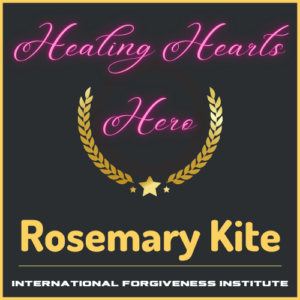 “Rosemary is a fabulous ambassador for forgiveness who has continually impressed me from the first day I met her,” according to Dr. Enright. “She is constantly trying to raise awareness of the importance and value of forgiveness in one’s everyday life. She definitely knows how to heal hearts through forgiveness.”
“Rosemary is a fabulous ambassador for forgiveness who has continually impressed me from the first day I met her,” according to Dr. Enright. “She is constantly trying to raise awareness of the importance and value of forgiveness in one’s everyday life. She definitely knows how to heal hearts through forgiveness.”
In her 2019 guest blog for this website, The Art and Science of Forgiveness, Rosemary wrote:
“The art and science of forgiveness suggests that the best medicine we can possibly take to improve our physical, psychological, social, and spiritual health, is forgiveness. Forgiveness is like the pill that offers the deepest healing of the wounds that fester in the human heart.”
Elsewhere she says: “As everyone who has ever had to forgive knows, every act of forgiveness begins with an injustice. We have wounded hearts all around us, everywhere we go. Why not try to be a healing heart to those we come across in our paths daily?”
Rosemary, who has a BA from California State University in San Francisco, has devoted her professional career to educational endeavors in the non-profit sector, primarily through the education of women and girls.

